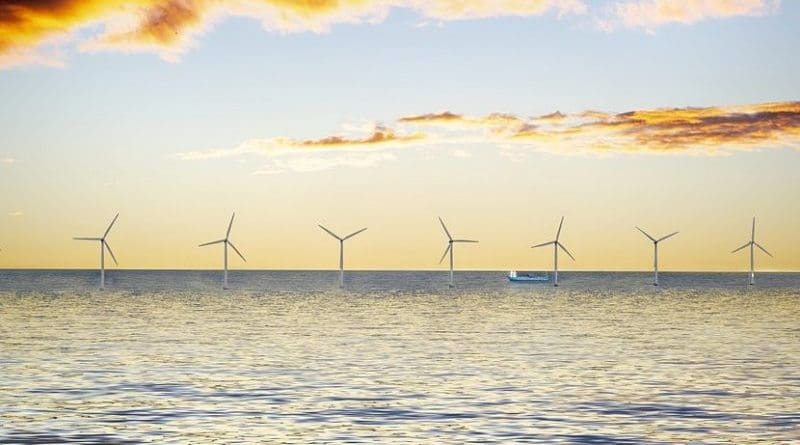Boosting Offshore Renewable Energy For A Climate Neutral Europe
To help meet the EU’s goal of climate neutrality by 2050, the European Commission Thursday presented the EU Strategy on Offshore Renewable Energy. The Strategy proposes to increase Europe’s offshore wind capacity from its current level of 12 GW to at least 60 GW by 2030 and to 300 GW by 2050. The Commission aims to complement this with 40 GW of ocean energy and other emerging technologies such as floating wind and solar by 2050.
This ambitious growth will be based on the vast potential across all of Europe’s sea basins and on the global leadership position of EU companies in the sector. It will create new opportunities for industry, generate green jobs across the continent, and strengthen the EU’s global leadership in offshore energy technologies. It will also ensure the protection of our environment, biodiversity and fisheries.
Executive Vice-President for the European Green Deal, Frans Timmermans said: “Today’s strategy shows the urgency and opportunity of ramping up our investment in offshore renewables. With our vast sea basins and industrial leadership, the European Union has all that it needs to rise up to the challenge. Already, offshore renewable energy is a true European success story. We aim to turn it into an even greater opportunity for clean energy, high quality jobs, sustainable growth, and international competitiveness.”
Commissioner for Energy, Kadri Simson, said: “Europe is a world leader in offshore renewable energy and can become a powerhouse for its global development. We must step up our game by harnessing all the potential of offshore wind and by advancing other technologies such as wave, tidal and floating solar. This Strategy sets a clear direction and establishes a stable framework, which are crucial for public authorities, investors and developers in this sector. We need to boost the EU’s domestic production to achieve our climate targets, feed the growing electricity demand and support the economy in its post-Covid recovery.”
Commissioner for Environment, Oceans and Fisheries, Virginijus Sinkevičius, said: “Today’s strategy outlines how we can develop offshore renewable energy in combination with other human activities, such as fisheries, aquaculture or shipping, and in harmony with nature. The proposals will also allow us to protect biodiversity and to address possible socio-economic consequences for sectors relying on good health of marine ecosystems, thus promoting a sound coexistence within the maritime space.”
To promote the scale-up of offshore energy capacity, the Commission will encourage cross-border cooperation between Member States on long term planning and deployment. This will require integrating offshore renewable energy development objectives in the National Maritime Spatial Plans which coastal states are due to submit to the Commission by March 2021. The Commission will also propose a framework under the revised TEN-E Regulation for long-term offshore grid planning, involving regulators and the Member States in each sea basin.
The Commission estimates that investment of nearly €800 billion will be needed between now and 2050 to meet its proposed objectives. To help generate and unleash this investment, the Commission will:
- Provide a clear and supportive legal framework. To this end, the Commission today also clarified the electricity market rules in an accompanying Staff Working Document and will assess whether more specific and targeted rules are needed. The Commission will ensure that the revisions of the State aid guidelines on energy and environmental protection and of the Renewable Energy Directive will facilitate cost-effective deployment of renewable offshore energy.
- Help mobilise all relevant funds to support the sector’s development. The Commission encourages Member States to use the Recovery and Resilience Facility and work together with the European Investment Bank and other financial institutions to support investments in offshore energy through InvestEU. Horizon Europe funds will be mobilised to support research and development, particularly in less mature technologies.
- Ensure a strengthened supply chain. The Strategy underlines the need to improve manufacturing capacity and port infrastructure and to increase the appropriately skilled workforce to sustain higher installation rates. The Commission plans to establish a dedicated platform on offshore renewables within the Clean Energy Industrial Forum to bring together all actors and address supply chain development.
Offshore renewable energy is a rapidly growing global market, notably in Asia and the United States, and provides opportunities for EU industry around the world. Through its Green Deal diplomacy, trade policy and the EU’s energy dialogues with partner countries, the Commission will support global uptake of these technologies.
To analyse and monitor the environmental, social and economic impacts of offshore renewable energy on the marine environment and the economic activities that depend on it, the Commission will regularly consult a community of experts from public authorities, stakeholders and scientists. Today, the Commission has also adopted a new guidance document on wind energy development and EU nature legislation.

